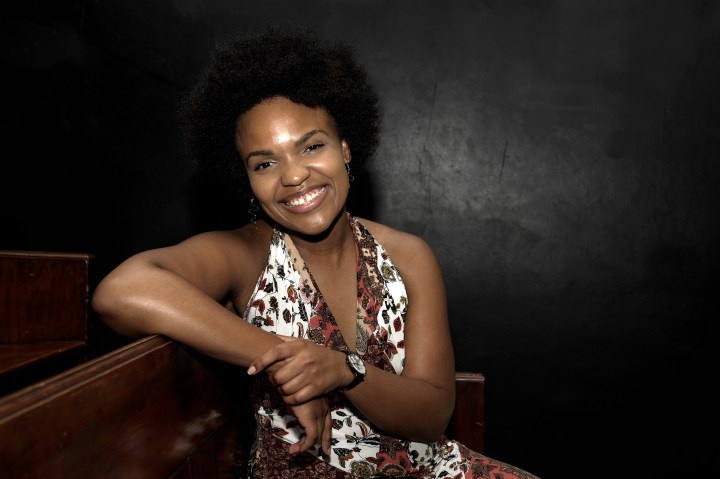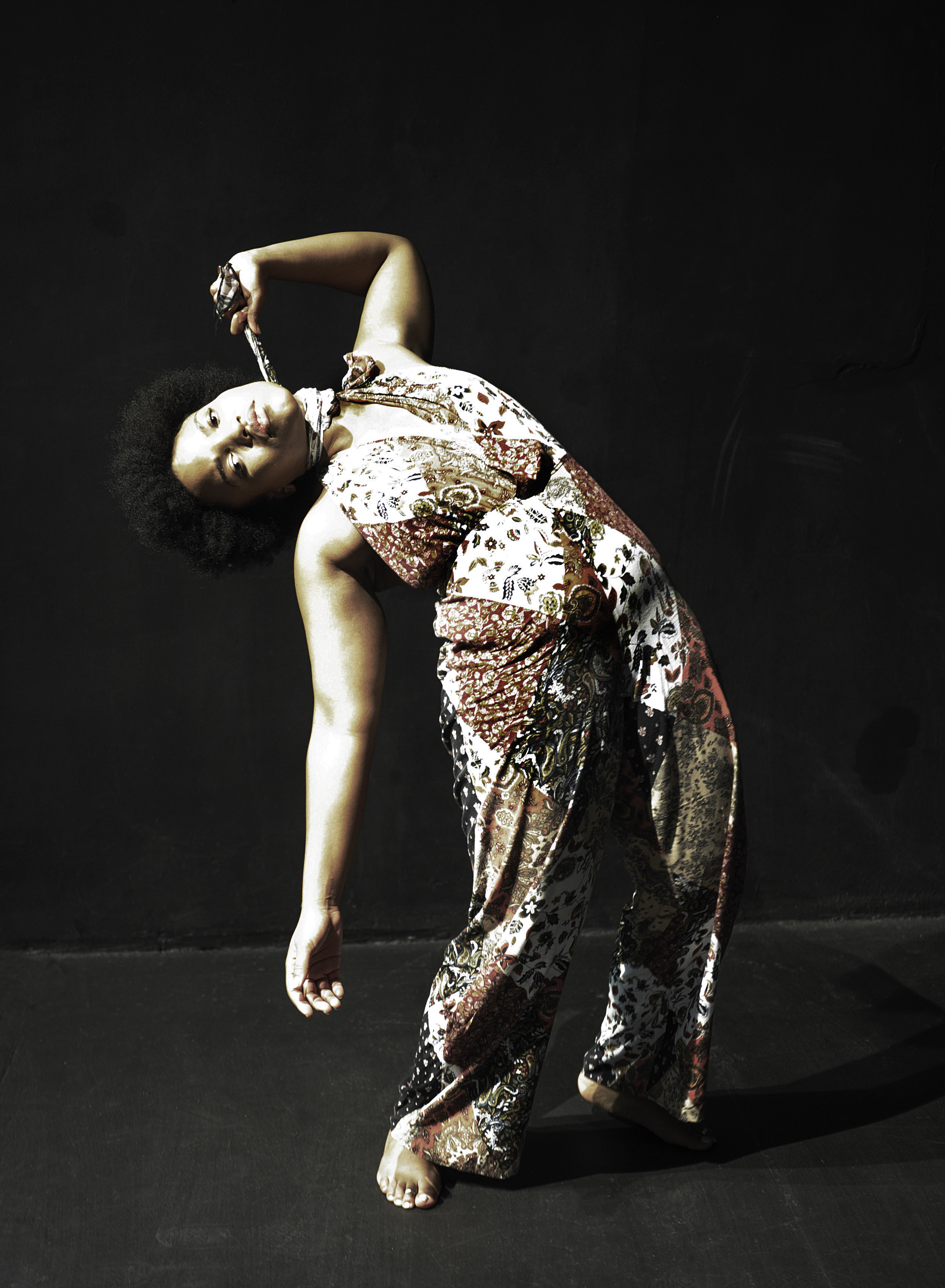Maverick Citizen: Friday Activist
Nancy Sekhokoane on Queening, #MenAreTrash and ‘He Had It Coming’

Nancy Sekhokoane addresses other women as ‘Queen’. Her spoken words are exuberant. Often she interrupts herself, finishing her own sentences in mock voices, her face animated and hands flying in gesture.
At 21 years old, the actress first made a name for herself as a joker, going on to garner acclaim for complex dramatic roles. She recently wrapped up shooting an American feature film – on which she is not allowed to divulge further detail – while hitting stages with He Had It Coming, a one-woman show on women’s issues penned by veteran playwright Mike van Graan and directed by Faniswa Yisa, an award-winning actress in her own right.

Nancy Sekhokoane Photo: Joyrene Kramer
Sekhokoane catapulted to national attention last year when she won Best Student at the prestigious Fleur du Cap Theatre Awards in Cape Town. Accepting the prize, she charmed the audience by gushing: “I’m so glad to be up here! Not just because this is the Artscape theatre, but also because I can’t breathe sitting down in this dress!”
The award stemmed from her studies at renowned creative college AFDA, where she completed a three-year degree in 2018. Weeks after graduating, she landed a starring part in a major Chicken Licken commercial campaign called “Soul Sisters”. The adverts saw her as one of a trio of back-up singers in shimmering sequined dresses, cheering on women in moments of need.
“That campaign was a blessing,” says Sekhokoane. “It was my first job ever after graduating. Like, I graduated in March and I did that shoot in April. I mean, people were like: ‘Girl, you’re supposed to struggle to find work!’ And I was like ‘Ooooh, not my Lord!’”
“I’ve been so lucky,” she adds. “Actually, no. It’s been divine intervention all the way. I have to bring it back to my faith. Doors have opened and I’m like: ‘How am I here? I’m 21, and how am I here?’ Oprah says her motto is excellence and I literally stole that from her. I was like, I want to be excellent in how I engage with people. The way in which we engage, that’s how we get opportunities. And not in a fake way. If you put your best foot forward, that’s what you will attract. Honestly, I don’t believe arseholes make it far. People I admire have made it big by being kind. They give back.”
For our interview, Sekhokoane suggests we revisit her old college: AFDA in Observatory, Cape Town.

Nancy Sekhokoane Photo: Joyrene Kramer
Crossing the campus, students approach her, holding smartphones aloft. Shyly, they ask her to pose with them in selfies. Sekhokoane laughs at the attention, then stands next to them, smiling into the cameras.
We pass a student bent over a tupperware lunch of legumes. “Yass Queen,” Sekhokoane says to her. “That looks so healthy! Can we have some?” She pauses to chat.
Inside a dusky rehearsal room, we sit down on wooden pews. The conversation turns to He Had It Coming, and Van Graan and Yisa’s contrasting styles. Van Graan’s writing is very direct “like a dagger” while Yisa’s direction is more nuanced, says Sekhokoane.
The play – a collection of sketches – has evolved since last year, with a marked shift to issues around gender-based violence following student Uyinene Mrwetyana’s murder in August.
“There’s this red scarf that we use in the piece,” says Sekhokoane. “And it can very easily be interpreted as blood. We use that to show people very directly what violence looks like. In one sketch, we show physically what it looks like for a woman to have her legs opened, forcefully. What is she feeling – terror, shock? We look at rape, correctional rape, emotional abuse. For example, there’s a monologue where this woman is an alcoholic and she’s being abused. It’s crazy how a lot of women see these things as the norm.”
Last year, Sekhokoane was one of thousands gathered at the University of Cape Town for Uyinene Mrwetyana’s memorial. “I heard Graça Machel speak and found it so riveting,” she recalls. “I was like: ‘If people don’t listen after this speech, then I don’t know.’ But, the thing is, nothing really changed. Women are still being murdered. I keep on hearing these stories and at some point I must admit, I became numb as well. I was like: ‘Oh my goodness, I can’t hear this any more.’ And I think that’s why Mike (van Graan) wanted to increase the focus on gender-based violence.”
Sekhokoane says starring in the play sparked reflection in her. She does not pretend to have answers. “I mean, it’s not like these men grow up thinking: ‘I’m going to be a racist. I will be a rapist.’ No. No-one just wakes up like that. These men are not born monsters. But what is it that makes them into what they are?
“I was watching this documentary while doing research for the play. They were saying that rapists, somewhere inside them, they feel a lack of power. So they overpower women, which makes them feel strong or manly for a few days, or for a few weeks, until they assault a woman again. I mean, in this country, I don’t think we talk enough. There is such a lack in communication; we just end up hating each other or killing each other or completely ignoring each other. It’s making me think of the Marikana massacre.
“So, why don’t we interrogate that? It’s the only way we can bring about change. Look at someone like Siya Kolisi. He had the most difficult upbringing. But look at what he did, at who he became with everything that was thrown at him.”
It is warm inside the rehearsal room, with perspiration beading Sekhokoane’s forehead. But when her hand brushes mine, it is cold to the touch.
“Then, this narrative of ‘boys will be boys’,” she continues. “That is one of the core issues we are facing today. Recently I saw this advert showing boys sitting, laughing. One of them is telling a joke about someone’s wife giving a blow-job to so-and-so. The camera pans to another boy. He hears the joke, but he doesn’t laugh. He just continues with his lunch. That was all the advert was about, simply the message: ‘As a boy, as a man, you don’t have to condone it’.”
Her feelings on the hashtag #menaretrash?
“In my past, I think I have used that hashtag,” says Sekhokoane. “And I felt justified in doing so in that moment. But I can’t allow myself to use it any more. I really believe in the power of the tongue, and by saying ‘men are trash’ a lot of them are actually like: ‘Cool, fine. I’ll be trash then.’ You know, it’s like giving them a get-out-of-jail-free card. I’m like: ‘No.’ I refuse to hold people to a lower standard than what I believe they can be. We need to speak into existence the change we want to see in this country.”
Sekhokoane grew up in Witbank, the second-born daughter of Alina and Moeketsi. Her parents met in Cuba, Alina’s home country. Her father was a member of Umkhonto weSizwe and he was taught by the National Union of Mineworkers who also sent him to study mining in Cuba, where he met her mother, who was studying medicine at the time. Sekhokoane’s sister, Carlota, was born in Cuba in 1995, after which the family moved back to South Africa.
“What I really respect about my parents is that they made themselves from the ground up,” says Sekhokoane. “No one gave them anything. “
In Sekhokoane’s early teenage years, her parents split. “That time is a blur,” she says. “I don’t remember my exact age at the time, I don’t remember much. All I can say is that my mother is my hero. She supported us, even after the divorce. Cooking and caring for us every day, after returning home from work.”
Carlota graduated with a degree in medicine from Stellenbosch University last year. It took some convincing for Moeketsi to allow his youngest daughter to study in theatre, but when her matric grades were good, he relented.
When did she know she wanted to become an actress?
“I was very quiet as a child,” says Sekhokoane. “I was bullied at school because I was overweight and very shy. And then at some point I was like: ‘Man this isn’t working for me’. So then somewhere in primary school, I made a switch. I was like: ‘I’m going to be the funny girl, I’m going to be the girl that makes jokes and who everyone likes, so that I can’t be attacked any more.’ I decided to be in control of whatever people were laughing at, so they couldn’t make fun of me.
“I used to make a lot of jokes about myself, too. Which I had to adjust later. I realised I was jeopardising myself for other people’s amusement. Every time I made myself a fool in front of people, I was taking away a piece from myself.”
In closing, Sekhokoane warns against the millennial cult of “yolo” – “You Only Live Once.”
“There’s this mindset amongst young people these days: ‘You Only Live Once! Let me live recklessly, use my time recklessly!’ The truth is, there is no yolo,” says Sekhokoane.
“People need to be taught the value of their bodies and their lives. These days the culture of the world is instant gratification: ‘What I want. What I want, right now.’ You know, less and less thought is being paid to consequences. Not just consequences to others, but to ourselves. For example, sex. Having lost my virginity and not being too content about the memories from certain sexual experiences, I want to be transparent so other people can learn from my mistakes. Take care of your body. I’m only 21. But there were doors I needn’t have opened and scars God shouldn’t have had to heal.”
Stepping out of the room, Sekhokoane’s goodbye hug lingers. Her words are loud and strong: “God bless you, Queen.” MC















 Become an Insider
Become an Insider